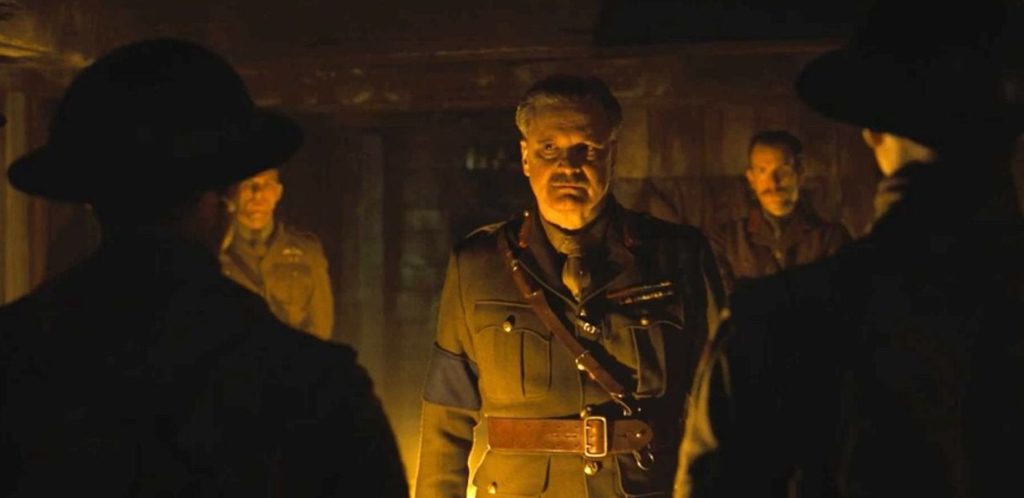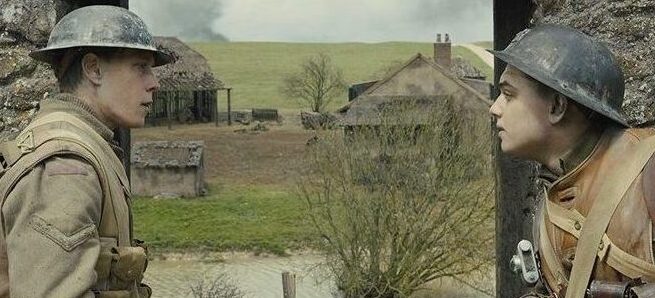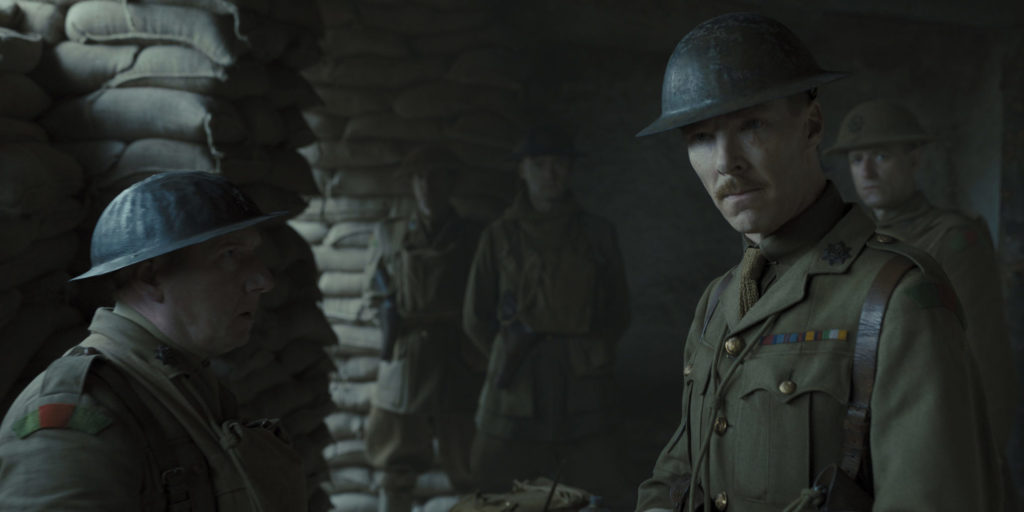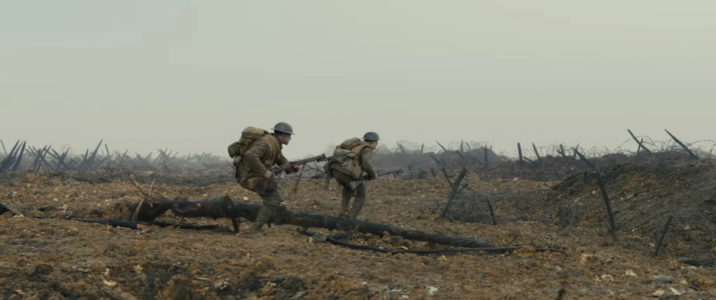The date is April 16, 1917. We open on a picturesque scene of a meadow on a calm, spring day. Two English soldiers sleeping under a tree in blissful contentment are suddenly awoken by their commanding officer to report in the main barracks. As they make their way through the trenches, all color washes out, the sky is overcast with dark clouds, and their breath lingers in the frigid air. This oppressive, foreboding ambience sets the mood for Sam Mendes’ 1917.
The two soldiers, Lance Corporal Blake and Lance Corporal Schofield (Dean-Charles Chapman and George MacKay, respectively) enter the barracks to find General Erinmore (Colin Firth) with dire news. The Germans have been falling back to the Hindenburg Line, seemingly on the run. But word has just reached HQ that the enemy’s retreat was intentional; a tactical ruse leading to a trap against a battalion under the command of Colonel Mackenzie (Benedict Cumberbatch). With no possible way to communicate with them, Erinmore assigns the two Lance Corporals the task of heading to Mackenzie’s location to warn him of the incoming ambush. Should they fail, 1600 soldiers will lose their lives, including amongst them Blake’s brother (Richard Madden). Together, they will venture through No Man’s Land and learn to overcome countless challenges including booby traps, barbed wire laced with human corpses and the forces of nature themselves.

When it comes to the portrayal of World War I in contemporary cinema, only a small handful of movies come to mind. In recent years, we have had films focusing on that particular period of world history, notably Steven Spielberg’s War Horse, or last year’s documentary, They Shall Not Grow Old from Peter Jackson. But overall, it does not seem to be a topic of high interest in Hollywood nowadays. While I cannot say 1917 brings any historical background on WWI, nor does it ever convey its everlasting legacy as one of the bloodiest world conflicts to a contemporary audience, it still has a few tricks up its sleeve, primarily technical, to make for an impressive experience.
Much has been discussed about the movie being shot like it is one long, single take, which we have seen in previous features like Rope, and Birdman, but never for a war film. Novelty aside, the film is a technical triumph on that score, with master cinematographer Roger Deakins in top form as he effortlessly maneuvers the camera through desolate landscapes, including a sequence inside a burning French town, its color schemes of somber orange reminiscent of the climax of Skyfall. This section includes an unforgettable shot of two people fighting and strangling each other, their silhouettes pronounced in the dim light.
As much as Deakins and director Sam Mendes fill the frame with grim imagery, there are also scenes of quiet beauty. One early sequence has Blake and Schofield pass through an orchard as Blake, having worked in one back home, notes the type of blossoms, indicating why they aren’t cherries. As they pass through a bombed house, Blake notices the lingering moss on the stone wall. “They’ll grow when the stones rot,” he says. It’s a simple observation, but it summarizes the movie’s prevalent theme on the tenacity of nature amidst human carnage and death. This central message likens 1917 to other war films, primarily The Thin Red Line, although Mendes’ direction here is much more measured and controlled than Malick’s spontaneity.
The method of telling the movie as one long take feels like Mendes returning to his theatrical roots before he made his cinematic splash 20 years ago with the Oscar-winning (if problematic) American Beauty. As much as his cinematic body of work has been seriously hit or miss since Beauty, Mendes’ strengths as a film director in framing and color schemes prevent his movies from feeling theatrical in their staging. Here, the connected sets make war-torn France feel like one elaborate stage. Mendes and his crew’s attention to nuance and detail manage to strike the perfect balance between movie-set artificiality and gritty realism.

Among the crew to be commended for their work here is frequent collaborator Thomas Newman. His haunting leitmotifs course through the film with melodic verve. One moment replicates the racing heartbeats of the characters, and when one dies, the magnitude of human loss is amplified by the music’s abrupt absence.
The cast, which includes notable British talent Mark Strong, Jamie Parker and Andrew Scott, alongside a sea of relatively unknowns, all give a solid work. The major standout in the ensemble, however, is MacKay, best known for playing Viggo Mortensen’s eldest son in Captain Fantastic. He truly comes into his own here giving a performance both physically and emotionally demanding, and guarantees a promising career ahead for himself as a leading man.
1917 is one of Mendes’ finer pictures, but it is not without its faults, primarily at the script level. The arc of the two leads, while well-acted, is less interesting than the elements surrounding them. I was more intrigued at seeing the shot of a stray cow at a decimated barn than in hearing why one of the soldiers gave up a medal for a drink. Plus, they have just one too many close calls with death, at one point even going over a waterfall without a scratch. Only in the movies, I suppose. While I am not sure if it would rank with the all-time great war movies, it still is an unforgettable experience worth seeing on the big screen.

